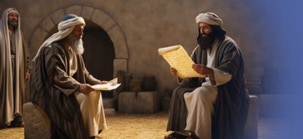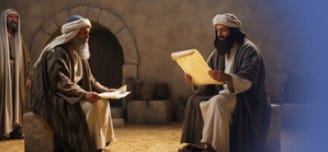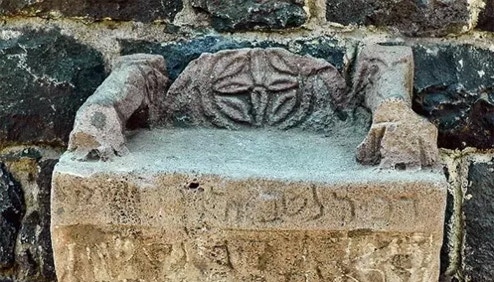


Common Objections
Common Objections
Catholic Outlook
Catholic Outlook

Catholic Outlook
Common Objections
Common Objections
__________ Recent Additions __________
Catholic Outlook
Catholic Outlook
__________ The Bible __________
“The Bible condemns the use of tradition as a source of authority.”
Gary Hoge

“The Pharisees sit in Moses’ seat.”
On the contrary, the Bible contains many examples of the use of tradition as a source of authority. For example:
Matthew 2:22-23
But when he [Joseph] heard that Archelaus was reigning in Judea in place of his father Herod, he was afraid to go there. Having been warned in a dream, he withdrew to the district of Galilee, and he went and lived in a town called Nazareth. So was fulfilled what was said through the prophets: “He will be called a Nazarene.”
This prophecy is not found anywhere in the Old Testament. Matthew was evidently citing a prophecy that was passed down orally as part of the Jewish oral Tradition. It was “said,” not “written.” The people must have been familiar with this oral Tradition because Matthew cited it to prove that Jesus was the Messiah. It would hardly have been convincing if he had referred to a prophecy the people had never heard of. By relying on this oral prophecy to uphold the legitimacy of Jesus’s claim to be the Messiah, Matthew placed it on an equal plane with the other prophecies he cited that were written in Scripture.
Matthew 23:2-3
“The teachers of the law and the Pharisees sit in Moses’ seat. So you must obey them and do everything they tell you. But do not do what they do, for they do not practice what they preach.”
The Old Testament never mentions Moses’ seat, but it was common knowledge in Israel that the authoritative teaching office of Moses was passed on to his successors. Thus, the Pharisees held a legitimate teaching office, and they must be obeyed, but not imitated.
As the first verse of the Mishna tractate Abote indicates, the Jews understood that God’s revelation, received by Moses, had been handed down from him in uninterrupted succession, through Joshua, the elders, the prophets and those of the great Sanhedrin (cf. Acts 15:21). The Scribes and Pharisees participated in this authoritative tradition and as such their teaching deserved to be respected.1
Jesus upheld the legitimacy of the Pharisees’ teaching office based on Tradition, not Scripture.
Matthew 23:35
“Upon you may fall the guilt of all the righteous blood shed on earth, from the blood of righteous Abel to the blood of Zechariah, the son of Berachiah, whom you murdered between the temple and the altar.”
In 2 Chronicles 24:20-21, the Bible tells us that Zechariah was stoned to death in the courtyard of the temple. But the Zechariah mentioned in 2 Chronicles was the son of Jehoiada, not Berachiah. Zechariah son of Berachiah was the author of the biblical book of the same name, and the Bible doesn’t say anything about how he died. According to Protestant author Gleason L. Archer,
[Jesus] knew what He was talking about. If so, then we discover that the Zechariah He was referring to was indeed the son of Berachiah (not Jehoiada), and that he was indeed the last of the Old Testament martyrs mentioned in the Hebrew Scriptures. In other words, Christ is recalling to His audience the circumstances of the death of the prophet Zechariah, son of Berachiah (Zech. 1:1) … [I]t may very well have been that sometime between 580 and 570 Zechariah the prophet was martyred by a mob in much the same way Zechariah the son of Jehoiada was some three centuries earlier. … In the absence of any other information as to how the prophet Zechariah died, we may as well conclude that Jesus has given us a true account of it.2
In other words, Jesus was referring to an oral tradition regarding the death of Zechariah, son of Berachiah. We can safely assume that this was common knowledge because he made this statement in the middle of a withering condemnation of the Pharisees and the teachers of the law. After Jesus rebuked them, they “began to oppose him fiercely and to besiege him with questions, waiting to catch him in something he might say.” If Jesus were presenting new information, these men would have pounced on that in order to undermine His credibility. The fact that they did not do so shows that this was not new information to them. Obviously, Jesus was relying on an oral Tradition that was well known to the Pharisees and the teachers of the law.
Acts 20:35
In everything I did, I showed you that by this kind of hard work we must help the weak, remembering the words the Lord Jesus himself said: “It is more blessed to give than to receive.”
You will search in vain if you try to find this saying of Jesus in the gospels. It was passed down orally for decades before Paul wrote it down, and he was obviously reminding people of something they already knew: “Hey guys, remember what Jesus said …” Of course, once Paul wrote these words down they ceased to be part of Tradition and became part of Scripture. But that does not change their truth. They were just as true before they were written down as they were after.
2 Timothy 3:8
Just as Jannes and Jambres opposed Moses, so also these men oppose the truth – men of depraved minds, who, as far as the faith is concerned, are rejected.
According to rabbinic tradition, Jannes and Jambres were the magicians who opposed Moses in Pharaoh’s court. Again, this information is not found in the Old Testament. Paul is relying on oral Tradition, and because that Tradition is now Scripture (it is now part of the New Testament), we know the Tradition was true.
Jude 8-9
In the same way, these dreamers pollute their own bodies, reject authority and slander celestial beings. But even the archangel Michael, when he was disputing with the devil about the body of Moses, did not dare to bring a slanderous accusation against him, but said, “The Lord rebuke you!”
According to Dr. Archer, “This account is not found in the Old Testament but is thought to have been included in a Christian treatise (now lost) entitled ‘the Assumption of Moses.’”3 Jude used this account as an authoritative source for teaching his readers that it is improper to slander celestial beings.
Jude 14-15
Enoch, the seventh from Adam, prophesied about these men: “See, the Lord is coming with thousands upon thousands of his holy ones to judge everyone, and to convict all the ungodly of all the ungodly acts they have done in the ungodly way, and of all the harsh words ungodly sinners have spoken against him.”
This prophecy of Enoch is not recorded in the Old Testament, but it is recorded in the extra-biblical book of 1 Enoch (verse 1:9), written circa 200 BC:
And behold! He cometh with ten thousands of His holy ones to execute judgement upon all, And to destroy all the ungodly: And to convict all flesh Of all the works of their ungodliness which they have ungodly committed, And of all the hard things which ungodly sinners have spoken against Him.4
We don’t know whether Jude copied from 1 Enoch, or whether he relied on the same oral Tradition as the author of 1 Enoch did, but in either case we see once again a New Testament author relying on an extra-biblical prophecy as authoritative. Notice also that Jude says Enoch “prophesied,” that is, he spoke the Word of God. Here we have a specific example of God’s own word being faithfully transmitted outside of Scripture for centuries before Jude wrote it down.
Obviously, neither Jesus nor the apostles limited themselves to scripture alone. According to Dr. Archer, “Apparently there was a valid and accurate body of oral tradition available to believers in the New Testament period.”5 So, not only did Jesus and the apostles not condemn the use of tradition as a source of authority, they demonstrated it.
__________
1 L. Sabourin, The Gospel According to St. Matthew (Bombay: St. Paul Publications, 1982), vol. 2, 793.
2 Gleason L. Archer, Encyclopedia of Bible Difficulties, (Grand Rapids, MI: Zondervan Corporation, 1982), 338.
3 Ibid, 430.
4 Translated by Dr. Jay Winter, The Complete Book of Enoch, Standard English Version, Winter Publications, 2015,
5 Ibid.
Copyright © 2024 Catholicoutlook.me
MENU